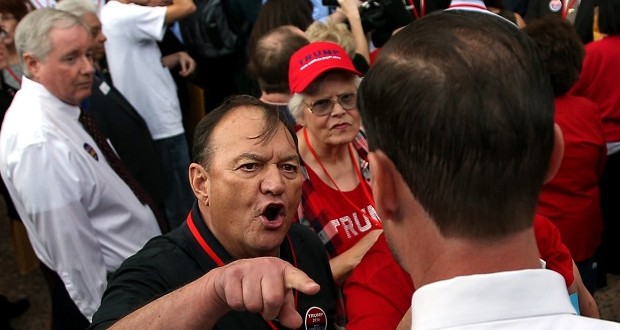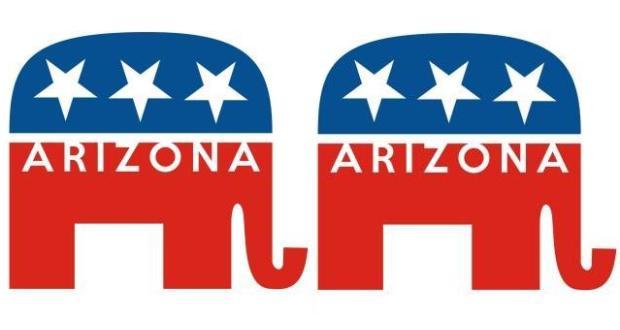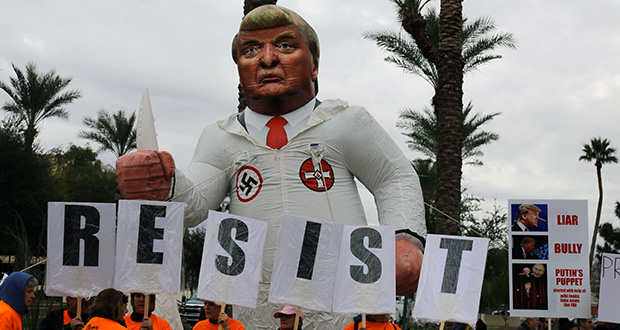Trump campaign says it was cheated out of delegates
Jeremy Duda//May 1, 2016//[read_meter]

Donald Trump’s allies blamed collusion by his rivals and technical glitches by the Arizona Republican Party for a drubbing at the state GOP convention, claiming the businessman and reality television star was cheated out of delegates for what could be a brokered convention in July.
State Treasurer Jeff DeWit, who chairs Trump’s Arizona campaign, claimed Trump supporters, including former Gov. Jan Brewer, were wrongly omitted from Trump’s slate in a round of electronic voting for at-large delegates at the party’s state convention on Saturday, while supporters of other candidates somehow appeared on the Trump slate.
Whatever the cause, Cruz notched a dominating win, likely ensuring the loyalty of a majority of Arizona’s delegates at the Republican National Convention in July.
By DeWit’s estimate, U.S. Sen. Ted Cruz, Trump’s chief competitor for the GOP’s presidential nomination, won about 39 of the 55 delegates elected at the state convention. And if Cruz’s allies are correct about the results of the first round of voting, Trump’s defeat was even worse.
DeWit said Trump fared well in the first round of voting, in which each of Arizona’s nine congressional districts used paper ballots to elect three delegates to the national GOP convention in Cleveland. But when the time came to elect 28 at-large delegates and an equal number of alternates through electronic voting, the treasurer claimed errors in the system and an alliance by rivals Cruz and John Kasich’s campaigns caused an anti-Trump landslide, in which he said the GOP frontrunner won only two delegates and four alternates.
Trump won Arizona’s March 22 presidential preference election with 46 percent to Cruz’s 28 percent.
It became apparent that something was wrong as electronic voting dragged on at the Mesa Convention Center. Rumors of a possible re-vote abounded when the omission of some Trump delegates came to light, and DeWit and Arizona GOP Chairman Robert Graham shuttled back and forth to sort out the problems.
When Graham closed voting and certified the election’s results, a livid DeWit cried foul.
“There’s a serious issue with the way this whole thing went down. They used some new electronic system. Our people that we submitted, in many cases the names were not showing up,” he said. “So, we are very unhappy, and the Trump campaign will absolutely be filing a grievance with what is happening here today. We are asking for a re-vote. And we hope that the party will allow us to have a re-vote.”
DeWit said the Trump campaign will file a lawsuit over the electronic voting issues.
Arizona has 58 delegates to the national convention in Cleveland, and for the first time in decades, those delegates could play a deciding role in which candidate receives the GOP presidential nomination.
The state’s delegates are bound by law to support Trump on the first ballot. But if Trump falls short of the 1,237 delegates he needs for the Republican nomination, Arizona’s delegates can switch sides on subsequent ballots.
The Arizona Republican Party opted to use electronic voting for the at-large delegates because the field of candidates, which numbered more than 700, was too large to fit on a traditional paper ballot. State delegates could vote electronically using machines provided by the party, as well as on smartphones and tablets.
At the heart of the dispute was a feature of the electronic voting system that allowed state delegates to simply check a box for one of four slates: Cruz, Kasich, Trump and a “unity” slate that featured supporters of all three remaining GOP presidential candidates.
Trump’s camp alleged several of the candidate’s supporters were left off of his slate, that others who weren’t supporting Trump were included on his slate. The most notable omission from the Trump slate was Brewer, one of his most prominent supporters in Arizona.
“I got cheated,” the former governor said. “And the people of Arizona got cheated.”
Brewer missed the cut to be a Trump delegate from the 8th Congressional District, but insisted that her election as an at-large delegate would have been a slam dunk.
“This one, I should have won hands down,” she said.
While addressing a group of Trump supporters after the convention, DeWit said he wasn’t accusing the Arizona Republican Party of doing anything wrong. But he insisted that the electronic system was “glitchy” and that the party should redo the election with paper balloting, overseen by the Maricopa County Recorder’s Office.
Graham rejected DeWit’s allegation that Trump was cheated.
The Arizona GOP chairman said he wasn’t in the room when the campaigns submitted their lists of names and couldn’t say whether the missing candidates resulted from an error by the Trump camp, as some party insiders insisted during the electronic voting. But Graham said all three campaigns were responsible for providing information about their slates to party officials. And he emphasized that the three campaigns reviewed the entire process, and that all had to approve their slates multiple times before they were finalized.
“Not only did they verify it once, they verified it twice, three times before they actually submitted. So, Mr. DeWit is making a habit of making outlandish comments to try to bust the integrity of a great meeting,” Graham said
Graham defended the electronic voting process as “technically sound.”
Cruz and Kasich’s campaigns joined forces in both the district-based and at-large voting, an alliance that bore fruit for the Texas senator and Ohio governor late in the convention. The two campaigns’ slates were nearly identical, differing by only two names. And the combined votes for the two slates outnumbered those for Trump, giving the “Never Trump” forces an edge.
Constantin Querard, who heads up Cruz’s efforts in Arizona, said the alliance between the two campaigns resulted in the overwhelming win for the Texas senator, and he derided what he said was Trump’s penchant for attributing any loss to cheating by others.
“If you add up the Cruz clicks and the Kasich clicks, it crushed the Trump clicks, which is why they lost. They lost because of math, not because of malfeasance,” Querard said.
Graham, too, attributed Trump’s loss in the at-large voting to the combination slate between Cruz and Kasich.
“When people lose, they get upset. There’s no question that I would be upset if my candidate lost or what have you, if I was working as hard as these guys have been on the ground,” he said. “But the reality is you had two sets of statements that are quite different, and one is after a defeat, which sometimes we see people get a little bit more bombastic if they lose.”
Cruz and Kasich’s teams took a similar approach to the congressional district elections. Rather than submit their own slate, Kasich’s allies joined forces with Cruz on Republican victory slate that included supporters of both candidates.
Querard said the pro-Kasich delegates who were elected on Saturday will support Cruz if the Republican National Convention goes to a second ballot.
DeWit’s accusations echoed comments that Trump and his allies have made across the country as he’s fought with Cruz for delegates who will remain loyal to him if the Republican National Convention goes past a first ballot.
During the lead-up to the convention, as the campaigns worked local district and county GOP meetings to elect slates of candidates who were committed to either pro-Cruz or Trump delegates, Trump’s supporters accused the Cruz campaign of attempting to “steal” delegates, despite the candidate’s overwhelming victory in March among Arizona Republican voters.
“For every one Cruz vote, there were two Trump votes,” DeWit said, referring to Trump’s win in Arizona’s presidential primary. “One of our top people did not even become an alternate. How does that happen if this is a fair process?”
DeWit said Trump won only two of the 28 at-large delegates and four alternates. Maricopa County Sheriff Joe Arpaio, who has endorsed Trump, was elected at-large, as were several others whose names appeared on multiple slates, including Attorney General Mark Brnovich and Secretary of State Michele Reagan, both of whom were on all four slates.
By contrast, DeWit claimed that Trump won 14 of the 27 delegates chosen by the congressional districts. He repeatedly emphasized that the district-based voting was done with traditional paper ballots, and that the elections were overseen by the Maricopa County Recorder’s Office, which didn’t conduct the electronic election later in the day.
But parsing the results of the elections to determine the winners was a tricky prospect. Some names appeared on both the Cruz and Trump slates, and Republican insiders said some Cruz supporters were simply misidentified as Trump backers.
Querard claimed that Cruz won 16 of the 27 district-based delegates, while Kasich won two others. State Rep. David Livingston, who was elected as part of the Cruz slate in Congressional District 8, said some of the people listed on the Trump slate were actually Cruz supporters.
“Some of the Trump people had some of our guys on their list,” the Peoria Republican said. “We did our due diligence.”
Three of the 27 winners from the congressional districts were on both slates, including Gov. Doug Ducey, who hasn’t endorsed a candidate and has repeatedly refused to say who he would vote for on a second ballot at the national convention. DeWit counted Ducey, a bitter rival, as one of Trump’s 14 wins in the first round of voting, while Livingston insisted that the governor would back Cruz.
“He’s with us,” Livingston said of Ducey.
Speaking to reporters earlier in the day, Ducey wouldn’t say if he was supporting the Cruz or Trump slate, and again declined to comment on how he would vote on a second ballot in Cleveland. He said only that his goal would be to help unify the party.
Arizona now becomes the most recent in a string of states where the Trump campaign has alleged wrongdoing by party officials or others after losing battles for delegates. Trump called the Colorado GOP’s delegate selection process “rigged,” and threatened to sue over the results of delegate elections in Louisiana.
Arpaio compared Arizona to those other states.
“This is a continuation that’s going across the nation going after Trump, and I’m sorry that it’s been localized here. But that’s what the truth is right now. It’s sad. Trump won this state big time. Big time,” Arpaio said.

















